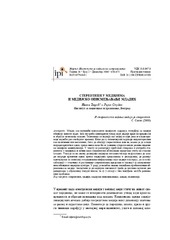Приказ основних података о документу
Stereotypes in media and media literacy among young people
Stereotipi u medijima i medijsko opismenjavanje mladih
| dc.creator | Đerić, Ivana | |
| dc.creator | Studen, Rajka | |
| dc.date.accessioned | 2021-03-17T13:25:12Z | |
| dc.date.available | 2021-03-17T13:25:12Z | |
| dc.date.issued | 2006 | |
| dc.identifier.issn | 0579-6431 | |
| dc.identifier.uri | http://ipir.ipisr.org.rs/handle/123456789/80 | |
| dc.description.abstract | Young people, the most common consumers of media content, bear out the view that media shapes people’s lives. Therefore we must not underestimate the effect media exerts on young people’s values and behavioral patterns. Television is the medium which draws children and young people for the greatest part of their free time. Regardless whether television programs are described as positive or negative, whether they abound with stereotypes or not, it is important that young people develop a critical attitude towards them so that they may resist different forms of media manipulation. The paper discusses how stereotypes are generated and used by media and the manners in which stereotypical concepts affect young people’s attitudes. It highlights the importance of the development of media literacy which implies a critical attitude towards media images and discourses, the development of criteria for the selection and evaluation of information broadcast by media, the development of skills in interpreting and understanding stereotypical concepts and familiarity with alternative forms of media culture. The paper draws special attention to the issue of media education. The conclusion is that schools should offer media literacy as part of their curriculum and in it possible solutions to the problems discussed. | en |
| dc.description.abstract | Mladi, kao najčešći konzumenti medijskih sadržaja, potvrđuju da mediji oblikuju živote ljudi. Zato ne treba zanemariti uticaj koji mediji vrše na vrednosti i obrasce ponašanja mladih. Televizija se izdvaja kao medij uz koji deca i mladi provode najveći deo slobodnog vremena. Bilo da su televizijski sadržaji okarakterisani kao pozitivni ili negativni, bilo da obiluju stereotipima ili ne, važno je da mladi izgrade kritički odnos prema njima kako bi se uspešno suprotstavili raznim vidovima medijske manipulacije. U tekstu se razmatraju problemi stvaranja i upotrebe stereotipa u medijima i način kako stereotipno oblikovane predstave utiču na stavove mladih. Ukazuje se na značaj razvijanja medijske pismenosti koja podrazumeva da mladi izgrade kritički odnos prema medijskim predstavama i diskursima, da razviju kriterijume za selekciju i vrednovanje informacija koje mediji plasiraju, da se osposobljavaju u tumačenju i razumevanju stereotipnih predstava i upoznaju sa alternativnim oblicima medijske kulture. U radu je posebna pažnja posvećena problematici obrazovanja za medije. Zaključeno je da medijska pismenost treba da postane sastavni deo repertoara u obrazovnoj ponudi škole, te su u skladu s tim ponuđena moguća rešenja ovog problema. | sr |
| dc.publisher | Institut za pedagoška istraživanja, Beograd | |
| dc.relation | info:eu-repo/grantAgreement/MESTD/MPN2006-2010/149001/RS// | |
| dc.rights | openAccess | |
| dc.rights.uri | https://creativecommons.org/licenses/by-nc-nd/4.0/ | |
| dc.source | Zbornik Instituta za pedagoška istraživanja | |
| dc.subject | stereotype | en |
| dc.subject | media | en |
| dc.subject | media literacy | en |
| dc.subject | young people | en |
| dc.subject | television | en |
| dc.subject | stereotipi | sr |
| dc.subject | mediji | sr |
| dc.subject | medijsko opismenjavanje | sr |
| dc.subject | mladi | sr |
| dc.subject | televizija | sr |
| dc.title | Stereotypes in media and media literacy among young people | en |
| dc.title | Stereotipi u medijima i medijsko opismenjavanje mladih | sr |
| dc.type | article | |
| dc.rights.license | BY-NC-ND | |
| dc.citation.epage | 471 | |
| dc.citation.issue | 2 | |
| dc.citation.other | 38(2): 456-471 | |
| dc.citation.spage | 456 | |
| dc.citation.volume | 38 | |
| dc.identifier.fulltext | http://ipir.ipisr.org.rs/bitstream/id/218/77.pdf | |
| dc.identifier.rcub | https://hdl.handle.net/21.15107/rcub_ipir_80 | |
| dc.type.version | publishedVersion |

